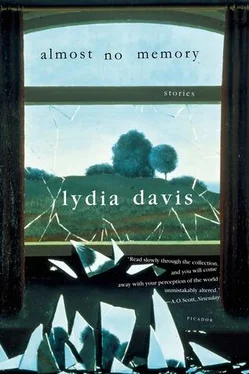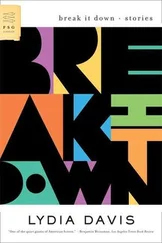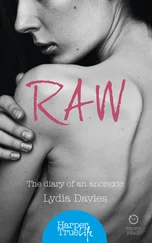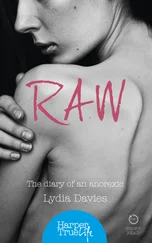Lydia Davis - Almost No Memory
Здесь есть возможность читать онлайн «Lydia Davis - Almost No Memory» весь текст электронной книги совершенно бесплатно (целиком полную версию без сокращений). В некоторых случаях можно слушать аудио, скачать через торрент в формате fb2 и присутствует краткое содержание. Год выпуска: 2001, Издательство: Farrar, Straus and Giroux, Жанр: Современная проза, на английском языке. Описание произведения, (предисловие) а так же отзывы посетителей доступны на портале библиотеки ЛибКат.
- Название:Almost No Memory
- Автор:
- Издательство:Farrar, Straus and Giroux
- Жанр:
- Год:2001
- ISBN:нет данных
- Рейтинг книги:3 / 5. Голосов: 1
-
Избранное:Добавить в избранное
- Отзывы:
-
Ваша оценка:
- 60
- 1
- 2
- 3
- 4
- 5
Almost No Memory: краткое содержание, описание и аннотация
Предлагаем к чтению аннотацию, описание, краткое содержание или предисловие (зависит от того, что написал сам автор книги «Almost No Memory»). Если вы не нашли необходимую информацию о книге — напишите в комментариях, мы постараемся отыскать её.
. In each of these stories, Davis reveals an empathic, sometimes shattering understanding of human relationships.
Almost No Memory — читать онлайн бесплатно полную книгу (весь текст) целиком
Ниже представлен текст книги, разбитый по страницам. Система сохранения места последней прочитанной страницы, позволяет с удобством читать онлайн бесплатно книгу «Almost No Memory», без необходимости каждый раз заново искать на чём Вы остановились. Поставьте закладку, и сможете в любой момент перейти на страницу, на которой закончили чтение.
Интервал:
Закладка:
What our employers needed most from us was simply that we stay in the house. We were not supposed to leave it for more than a few hours, because it had been robbed so often. We left it overnight only once, to celebrate New Year’s Eve with a friend many miles away. We took the dogs with us on a mattress in the back of the car. We stopped at village fountains along the way and sprinkled water on their backs. We had too little money, anyway, to go anywhere. Our employers sent us a small amount each month, most of which we spent immediately on postage, cigarettes, and groceries. We brought home whole mackerels, which we cleaned, and whole chickens, which we beheaded and cleaned and prepared to roast, tying their legs together. The kitchen often smelled of garlic. We were told many times that year that garlic would give us strength. Sometimes we wrote letters home asking for money, and sometimes a check was sent for a small sum, but the bank took weeks to cash it.
We could not go much farther than the closest town to shop for food and to a village half an hour away over a small mountain covered with scrub oaks. There we left our sheets, towels, table linen, and other laundry to be washed, as our employers had instructed us to do, and when we picked it up a week later, we sometimes stayed to see a movie. Our mail was delivered to the house by a woman on a motorcycle.
But even if we had had the money, we would not have gone far, since we had chosen to live there in that house, in that isolation, in order to do work of our own, and we often sat inside the house trying to work, not always succeeding. We spent a great deal of time sitting inside one room or another looking down at our work and then up and out the window, though there was not much to see, one bit of landscape or another depending on which room we were in — trees, fields, clouds in the sky, a distant road, distant cars on the road, a village that lay on the horizon to the west of us, piled around its square church tower like a mirage, another village on a hilltop to the north of us across the valley, a person walking or working in a field, a bird or a pair of birds walking or flying, the ruined outbuilding not far from the house.
The dogs stayed near us almost all the time, sleeping in tight curls. If we spoke to them, they looked up with the worried eyes of old people. They were pure-bred yellow Labradors, brother and sister. The male was large, muscular, perfectly formed, of a blond color so light he was nearly white, with a fine head and a lovely broad face. His nature was simple and good. He ran, sniffed, came when we called, ate, and slept. Strong, adept, and willing, he retrieved as long as we asked him to, running down a cliff of sand no matter how steep or how long, plunging into a body of water in pursuit of a stick. Only in villages and towns did he turn shy and fearful, trembling and diving toward the shelter of a café table or a car.
His sister was very different, and as we admired her brother for his simple goodness and beauty, we admired her for her peculiar sense of humor, her reluctance, her cunning, her bad moods, her deviousness. She was calm in villages and cities and would not retrieve at all. She was small, with a rusty-brown coat, and not well formed, a barrel of a body on thin legs and a face like a weasel.
Because of the dogs, we went outside the house often in the course of the day. Sometimes one of us would have to leave the warm bed at five in the morning and hurry down the cold stone steps to let them out, and they were so eager that they leaked and left a pattern of drops on the red tiles of the kitchen and the patio. As we waited for them, we would look up at the stars, bright and distinct, the whole sky having shifted from where it was when we last saw it.
In the early fall, as grape-pickers came into the neighboring fields to harvest, snails crept up the outside of the windowpanes, their undersides greenish-gold. Flies infested the rooms. We swatted them in the wide bands of sunlight that came through the glass doors of the music room. They tormented us while alive, then died in piles on the windowsills, covering our notebooks and papers. They were one of our seven plagues, the others being the fighter jets that thundered suddenly over our roof, the army helicopters that batted their more leisurely way over the treetops, the hunters who roamed close to the house, the thunderstorms, the two thieving cats, and, after a time, the cold.
The guns of the hunters boomed from beyond the hills or under our windows, waking us early in the morning. Men walked alone or in pairs, sometimes a woman trailed by a small child, spaniels loping out of sight and smoke rising from the mouths of the rifles. When we were in the woods, we would find a hunter’s mess by the ruins of a stone house where he had settled for lunch — a plastic wine bottle, a glass wine bottle, scraps of paper, a crumpled paper bag, and an empty cartridge box. Or we would come upon a hunter squatting so motionless in the bushes, his gun resting in his arms, that we did not see him until we were on top of him, and even then he did not move, his eyes fixed on us.
In the village café, at the end of the day, the owner’s young son, in olive-green pants, would slip around the counter and up the stairs with his two aged, slinking, tangerine-colored dogs, at the same time that women would come in with the mushrooms they had gathered just before dusk. Cartridge cases peppered the ground across a flat field near the house, one of the odd waste patches that lay in this valley of cultivated fields. Its dry autumn grass was strewn with boulders, among them two abandoned cars. Here from one direction came the smell of wild thyme, from the other the smell of sewage from a sewage bed.
We visited almost no one, only a farmer, a butcher, and a rather pompous retired businessman from the city. The farmer lived alone with his dog and his two cats in a large stone house a field or two away. The businessman, whose hyphenated name in fact contained the word “pomp,” lived in a new house in the closest village, to the west of us across the fields. The young butcher lived with his childless wife in town, and we would sometimes encounter him there moving meat across the street from his van to his shop. Cradling a beef carcass or a lamb in his arms, he would stop to talk to us in the sunlight, a wary smile on his face. When he was finished working for the day, he often went out to take photographs. He had studied photography through a correspondence course and received a degree. He photographed town festivals and processions, fairs and shooting matches. Sometimes he took us with him. Now and then a stranger came to the house by mistake. Once it was a young girl who entered the kitchen suddenly in a gust of wind, pale, thin, and strange, like a stray thought.
Because we had so little money, our amusements were simple. We would go out into the sun that beat down on the white gravel and shone off the leaves of the olive tree and toss pebbles one by one, overhand, from a distance of ten feet or so into a large clay urn that stood among the rosemary plants. We did this as a contest with each other, but also alone when we were finished working or couldn’t work. One would be working and hear the dull click, over and over, of a pebble striking the urn and falling back onto the gravel, and the more resonant pock of the pebble landing inside the urn, and would know the other was outside.
When the weather grew too cold, we stayed inside and played gin rummy. By the middle of winter, when only a few rooms in the house were heated, we were playing so much, day and night, that we organized our games into tournaments. Then, for a few weeks, we stopped playing and studied German in the evenings by the fire. In the spring, we went back to our pebble game.
Nearly every afternoon, we took the dogs for a walk. On the coldest days of winter, we went out only long enough to gather kindling wood and pine cones for the fire. On warmer days, we went out for an hour or more at a time, most often into the government forest that spread for miles on a plateau above and behind the house, sometimes into the fields of vines or lavender in the valley, or into the meadows, or across to the far side of the valley, into old groves of olive trees. We were surrounded for so long by scrub brush, rocks, pine trees, oaks, red earth, fields, that we felt enclosed by them even once we were back inside the house.
Читать дальшеИнтервал:
Закладка:
Похожие книги на «Almost No Memory»
Представляем Вашему вниманию похожие книги на «Almost No Memory» списком для выбора. Мы отобрали схожую по названию и смыслу литературу в надежде предоставить читателям больше вариантов отыскать новые, интересные, ещё непрочитанные произведения.
Обсуждение, отзывы о книге «Almost No Memory» и просто собственные мнения читателей. Оставьте ваши комментарии, напишите, что Вы думаете о произведении, его смысле или главных героях. Укажите что конкретно понравилось, а что нет, и почему Вы так считаете.












